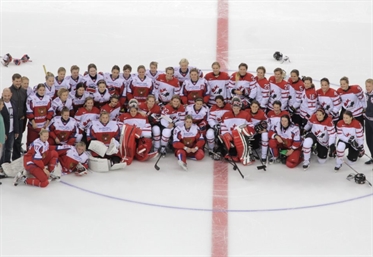Women put to test in Sochi
Women put to test in Sochi
Russia hosts Canada for exhibition games in Olympic venue

 The Russian and Canadian players pose for a joint team photo at Shayba Arena during their camp in Sochi. Photo: Kristopher Young / Hockey Canada Images
The Russian and Canadian players pose for a joint team photo at Shayba Arena during their camp in Sochi. Photo: Kristopher Young / Hockey Canada Images
With temperatures still going up to 25°C, there are usually two types of people visiting the city these days: tourists enjoying the resort hotels and beaches and then those coming in the build-up process leading to the Olympics.
The almost 50 ladies assembling at the Shayba Arena wore different helmets than the hordes of workers at the Olympic areas of the Adler district. It was the women’s national teams of host Russia and defending Olympic champion Canada who hit the ice at the arena that will host most games of the Olympic women’s ice hockey tournament next February.
It was the first international games in Sochi since the 2013 IIHF Ice Hockey U18 World Championship that put the two excellent Olympic ice hockey venues to a test last April.
Both teams have high ambitions. Canada aims for the fourth straight Olympic gold in women’s ice hockey, but the players know they will have serious competition. Most notably from the U.S. that won gold in four of the last five Women’s World Championships, most recently 2013 in the Canadian capital of Ottawa.
Both North American teams centralize their teams to be best prepared for the Olympic challenge, but also Russia’s women’s national team is on a rise. More funds have been invested in the women’s hockey program in recent years and the team replied with a bronze medal at the last Women’s Worlds after a sixth-place finish in 2012 – their second medal and their first since 2001.
The Russians prepare under better conditions nowadays and the players are paid for their job on the team and with their clubs. A realistic goal in Sochi is to win a medal and after the recent results, this doesn’t seem to be too far-fetched.
Continue reading“The Russian women’s team has improved a lot lately, we clearly see the result of the work they put into the game,” said Team Canada coach Dan Church. “They are physical on the ice and they have a lot of energy. There is of lot of talent in their team.”
While the Russians may dream of medals, they are closer to the bronze than to any other colour. The hierarchy in women’s hockey has had movements in most regions of the 36-team IIHF Women’s World Ranking since Vancouver 2010, but the top-two positions remain in North American hands. The scores from Sochi confirm the status-quo.
The score of the first game was tight in the first period with the only goal coming from Canada’s Natalie Spooner. Shortly after the break, Jocelyne Larocque and Meghan Agosta-Marciano made it 3-0 and before the next intermission, Canada held a 4-1 lead after goals from Meaghan Mikkelson and Yekaterina Lebedeva, who scored Russia’s only goal on a 5-on-3 power-play. Spooner added two more goals for a hat trick and a 6-1 win.
Also the second game was only close in the opening stages. Russia’s captain Yekaterina Smolentseva cut the Canadian lead to 2-1 midway through the game but eventually Canada overpowered the host in a 9-1 victory. Eight different players scored for Canada with Jennifer Wakefield contributing with a pair.
Both teams will play in different groups at the Olympics so the spirit was good in Sochi where the teams even had time for a joint team photo after the exhibition.
Former world-class player Alexei Yashin was on the tribune to watch the Russian women’s team he joined as the GM last season.
“It’s a sure thing that we would have liked different results, but I’m convinced that it’s good for us to play against strong opponents and Canada is the strongest team even if they didn’t win World Championship gold,” said Yashin.
“In the first game our players showed good hockey and fought hard in the Canadian zone but our rivals turned out to be more experienced and skilful.”
Russia will continue with a calendar denser than usual. In October they will host Germany for three games, play club teams in the United States end of November and participate in tournaments in Örebro, Sweden (December) and Füssen, Germany (January) before the immediate Olympic preparation which will feature an exhibition game against Japan.
For the Canadian players it was the start of intense months. Church wanted to bring his team together and to use the opportunity to make it familiar with the venue and environment in Sochi.
The North American teams will prepare with their centralized teams mostly on their continent. Canada will play six more games this month after returning to Calgary and seven in October, mostly against midget teams.
Canada, the U.S., Finland and Sweden will also play a Four Nations Tournament in Lake Placid, USA, 5-9 November.
Team USA recently came together for a team-building camp in San Diego, California and will now focus on preparing on the ice including four games against Canada and the tournament games against Finland and Sweden. The team will primarily train in Bedford, Massachusetts, and it has the same goal like their Canadian rivals: gold.
Back to Overview







































